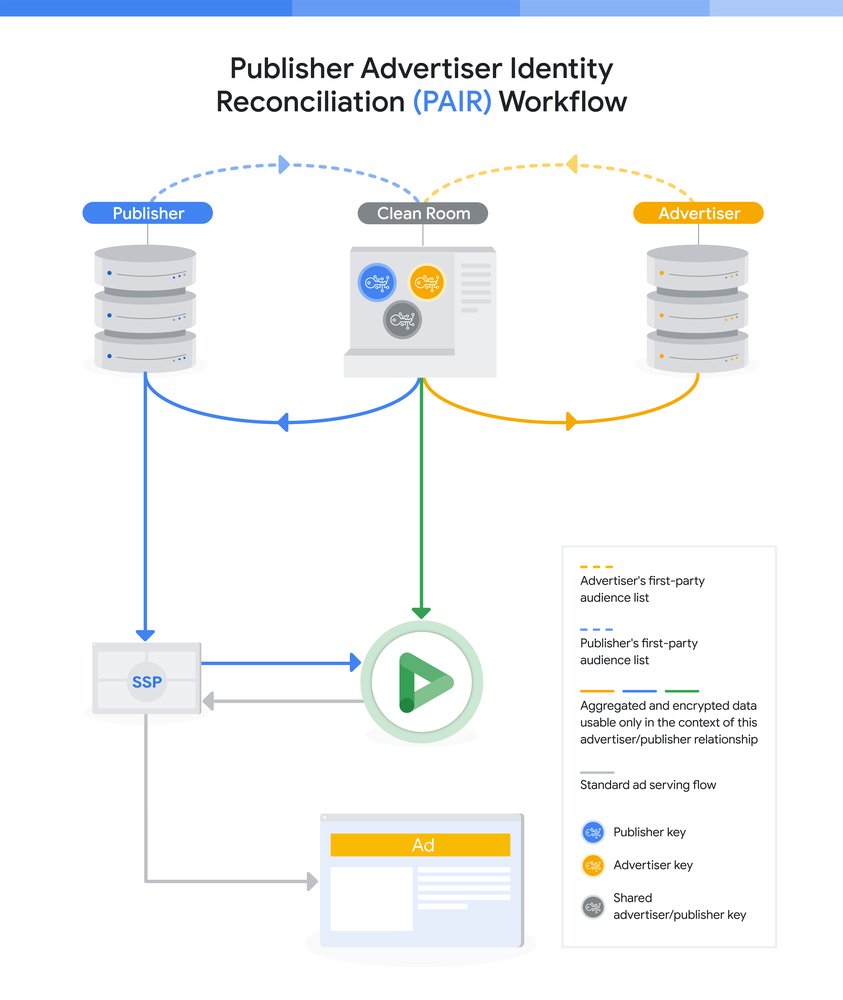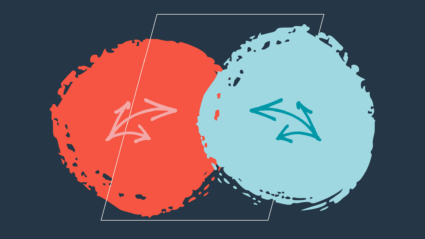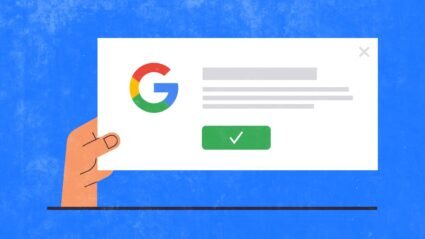Google recently announced a new first-party data solution called Publisher Advertiser Identity Reconciliation (PAIR) “that gives publishers and advertisers the option to securely and privately reconcile their first-party data for audiences who have visited both an advertiser’s and a publisher’s site.”
One of the biggest concerns advertisers have around a privacy-first future is around the feasability of retargeting, a core component of most performance marketing strategies. With less data and less tracking, how can campaigns accurately target audiences that are already known to the brand?
PAIR is Google’s answer, and it’s not a proposal coming out of the Privacy Sandbox, it’s something that you can start using today. Let’s dig into how PAIR works, how it can help your brand, and what it means for the future.
What is Google PAIR and how does it work?
Google PAIR is a clean-room-like add-on available through Display & Video 360 (DV360) that is built to help campaigns accurately retarget known customers while maintaining data privacy because no PII is pooled or shared.
Essentially, PAIR lets you match your customer email lists against other publishers’ audiences; data clean rooms manage the data upload and encryption, then allow you to connect the encrypted data.
Pooled data solutions like UID 2.0 have run into potential regulatory challenges because they theoretically leave the door open for individual identification; PAIR lets two encrypted data sets meet in the middle instead of pooling them together, so each advertiser or publisher retains complete control over their own data set.

Source: Google
PAIR cross-references aggregate first-party data, which makes it much more likely to pass the regulatory sniff test because Personal Identifiable Information (PII) stays private and secure, including from Google itself. In fact, it does not use any Google data at all, just first-party data from publishers or advertisers.
“PAIR also protects advertisers and publishers from data leaks by encrypting their first-party data three times with three different keys: an advertiser key, a publisher key, and a key shared between the two parties.”
Publishers and advertisers will only be able to target known users, so people will only see ads from brands they are familiar with or have already shared information with. Google PAIR can also be used with any supply-side platform. Although Google’s timeline for third-party cookie deprecation is prone to fluctuation, PAIR represents a significant step forward for Google as a methodology that could help advertisers maintain deterministic targeting capabilities without relying on cookies.
Remember: cookiepocalypse has already started, even if the official end date has gotten a couple of stays of execution. Taking a solution like PAIR into the market for testing gets Google closer to an endgame, and underlines the importance of first-party data in your future marketing plans.
What can marketers use PAIR for?
Google PAIR will help you reach users that have already shared their contact information and permission with your business. You’ll be able to better connect with known customers for retargeting campaigns, abandon cart reminders, and exclusion from ads for a product they’ve already purchased. It is definitively not an acquisition solution.
“PAIR gives advertisers the ability to more closely connect with their known audiences while avoiding tracking individuals across the web. As a result, advertisers can show relevant ads to some of their highest-intent audiences, helping to increase advertising performance and hit marketing objectives, while respecting people’s privacy expectations.”
The PAIR solution will also give Google an edge in the programmatic marketplace as the race to give advertisers as much precision in targeting as possible in a privacy-centric way continues to heat up between different ad tech and buying platforms.
PAIR will likely expand over the next year, especially when Ads Data Hub, Google’s standalone clean room due for wide release in Q2 2023, is added as a partner option. Right now PAIR is using outside partners InfoSum, LiveRamp, and Habu to encrypt the data instead of their own clean room technology, but the search giant has already indicated that it’s planning to add additional options.
There are two major questions we will be looking to answer as we start testing Google PAIR for our clients:
- How effective will targeting using PAIR be compared to current targeting capabilities?
- Since it’s only been in limited testing so far, how will PAIR scale?
There are always challenges scaling any first-party data solution, particularly new tools that are transitioning out of limited testing with early adopters. But we think Google PAIR’s targeting solution looks promising, and we’ll look to establish a testing timeline as quickly as possible.
The LiveRamp identity spine that Google is using is a known entity when it comes to ID resolution. That in particular gives us some extra confidence in the product since it’s really just a novel way of matching IDs without actually sharing the data. In theory, the match keys should be the same as if you were doing a direct upload to LiveRamp, so resolution should be similar to what advertisers are doing now.
As far as privacy-compliant bets on the future are concerned, we think this is a smart approach and likely to be resilient, both in terms of regulatory standards and targeting effectiveness. .
Our recommendation: start familiarizing yourself with Google PAIR, plan some retargeting campaign tests, then evaluate how it will fit into your overall targeting strategy.








Responses